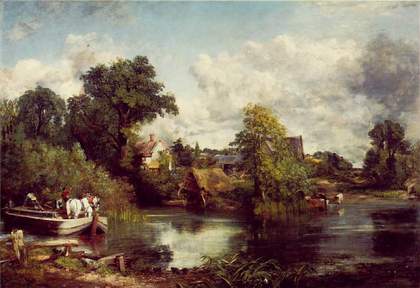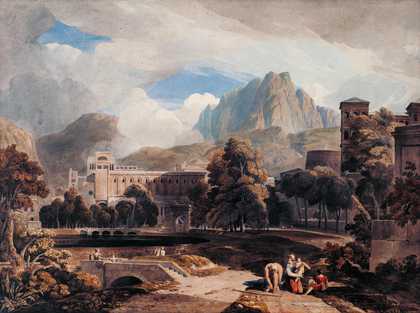At Hadleigh there is a ruin of a castle. it commands a view of the Kent hills, the Nore and North Foreland & looking many miles to sea. I have filled as usual a little book of hasty memorandums of the places which I saw.
John Constable to Maria Bicknell, 1814
Pencil sketch (1814)
Nearing forty, he found himself at the mouth of the estuary. The last low rise, the last shallow fall. He wanted to marry. Five years and Maria’s letters still displayed as much insistence as obedience: You must be certain that you cannot write without increasing feelings that must be entirely suppressed. The work to be done: a lacy dowager, that gilded boy, a banker’s eight starched children. The work to be done. His tender reputation, Maria’s insistence: the portrait you gave me looks pale, as you did then, that is the only fault I find with it. This Norman look-out, this last royal resort, the oubliette for bad marriage, taking shape, changing hands, giving up as the land gave way, a sudden low slide into the sea. See how the slope descends in waves, the shallow slips. Little shocks. The steam locomotive. War in America, in France. He jotted down contours, pulled the two last towers together, shaded one, scattered the birds but never went back. I should paint my own places best. Not a place he had reached yet.
Small oil sketch (1828–9)
The big picture years. The barns and fields, the gardens and mills, joy, marriage, joy, seven children. And then Maria to Brighton, for a cure. By November, it was over. Hourly do I feel the loss of my departed Angel. I shall never feel again as I have felt the face of the world is totally changed to me. He dressed in mourning for the rest of his life and found himself returned to a place from a time of prospect: nowmet and gone beyond, and mattering. Did he know the island at the foot of the castle was once five islands, a place of fever, where brides faded like crocuses, and a man got through a dozen or more, bringing them out to live on black water? He rendered it stronger, darker, the opposite of a view, more an atmosphere he had somehow remembered, but not noted before. Before.
Sketch, pen on paper (1828–9)
A step back. The castle more distant, the sky expanding, the opening sea. A shift to the right, lifting off into a gull’s-eye view, the eye free to glance off the ruins, out to sea. A plan, with added punctuation: a tree bridging the towers, and a shepherd and dog who neither stand out nor tell stories nor take up space. The more he adds, the more space.
Large oil sketch (1828–9)
Gulls circling the towers crumble into air as if the castle were blowing away on the wind. The scene so stirred, this broad spill of land is all unsteadiness, a turmoil of hedgerow and hawthorn, salt and cheese, mud and stone. Brightness catches like wool on barbed wire, stumbles on yellow and Roman red. Sky is vertical, sheet-metal, heaping and tipping white. Sea flattened to nothing. The castle hard left, low, a couple of broken drains. The edge of England offers no foothold, no way back. Like an idea, it is more water and air than anything.
Hadleigh Castle, the mouth of the Thames: Morning after a Stormy Night (1829)
After. Calmed, scoured, the highlights so cold, so crystalline, they speak of Constable’s snow. The storm has unpainted whatever is most exposed: the small sharp tips of things. What little warmth is in the sky is more a touch of earth than sun. Everything gives up something to such brightness – so opaque, so absolute, the eye keeps wanting to turn it down – these splashes of whitewash that might have dripped from a newly painted ceiling. Turner’s slight. Constable’s mind, his empty ceiling. Leslie recording an amusing scene before this picture at the Academy on one of the varnishing days. Chantrey told Constable its foreground was too cold, and taking his palette from him he passed a strong glazing of asphaltum all over that part of the picture,and while this was going on, Constable,who stood behind him in some degree of alarm,said to me “there goes all my dew”.
Photographs (December, 2005)
Fragments of shell caught in the mortar of the castle walls. Constable’s snow. Thin snow ploughing thin fields north-south, east-west, in defence. Flat as paper. Telegraph poles rise like spires. The sure blue line of a train. The sky behaves as if it were the world and this just so many letters. Beyond the derelict gas terminal, an emerald damsel-fly hovers. One of the varnishing days. Across the water, a power station raises its mirror.



